英语语法分析句子成分分析
英语语法--句子成分分析(13张)

Exercises:分析句子结构
1)I am a teacher and I touch the future. 2)He felt happy today. 3)You make my heart smile. 4)he likes playing football. 5)After he finished his homework, he went to school.
名,代,数,不定 式,动名词,短语或 句子 动词或动词词组
We like Tie Zhu
谓语
We like Tie Zhu
宾语
表语
表示动作行为的对象
与联系动词连用,一起构成谓 语,说明主语的性质或特征 用来修饰名词或代词 修饰动词,形容词,副词,表 示动作发生的时间,地点,原 因,目的,方式等 逻辑上与宾语是主谓关系
4)感官系动词 feel, smell, sound, taste 例如:This kind of cloth feels very soft. 注意:系动词不用于被动语态. 5)变化系动词 become, grow, turn, fall, get, go, come, run. 例如: He became mad after that. 。
系动词
1)状态系动词(be动词) 例如: I am a teacher. 2)持续系动词 keep, rest, remain, stay, lie, stand 例如:The key to longevity is that one should keep his breath. 3)表像系动词 seem, appear, look, 例如:He looks tired.
宾语 补足语
形容词,名词,不定 式,介词短语等
英语语法精讲——句子成份分析

第一讲英语的句子结构步骤一:句子结构的解析一、句子成分一个句子一般由两部分组成,即主语部分(subject group)和谓语部分(predicate group)。
句子成分(members of the sentence)是句子中起一定功用的组成部分。
句子由各个成分所构成。
1.主语主语(subject)是一个句子的主题(theme),是全句所述说的主体,一般置于句首。
可用于作主语的有单词、短语、从句乃至句子。
1)名词作主语 e.g. A tree hasfallen across the road.2) 代词作主语 e.g. You’re not far wrong.3) 数词作主语。
e.g. Three is enough.4)名词化的形容词作主语 e.g. The idle are forced to work.5)副词作主语 e.g. Now is the time.6)名词化得介词作主语 e.g. The ups and downs of life must be taken as they come.7) 不定式作主语 e.g. To find your way can be a problem.8)动名词作主语 e.g. Smokingis bad for you.9)名词化的过去分词作主语 e.g. The disabled are to receive more money.10) 介词短语用作主语e.g. From Yenan to Nanniwan was a three-hour ride on horseback.11) 从句用作主语 e.g. Whenever you are ready will be fine. 12) 句子做主语 e.g. “How do you do” is a greeting.主语可由一个以上的名(代)词等构成,这种主语可叫作并列主语。
e.g. He and I are old friends.英语常用无人称的名词作主语。
英语语法大全 句子成分分析
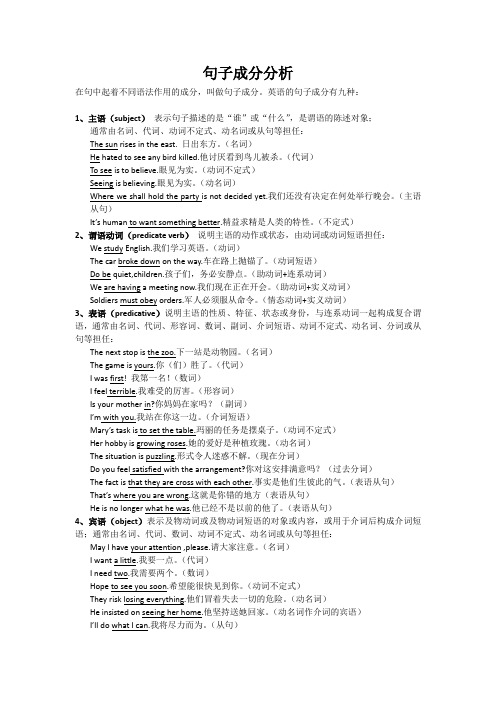
句子成分分析在句中起着不同语法作用的成分,叫做句子成分。
英语的句子成分有九种:1、主语(subject)表示句子描述的是“谁”或“什么”,是谓语的陈述对象;通常由名词、代词、动词不定式、动名词或从句等担任:The sun rises in the east. 日出东方。
(名词)He hated to see any bird killed.他讨厌看到鸟儿被杀。
(代词)To see is to believe.眼见为实。
(动词不定式)Seeing is believing.眼见为实。
(动名词)Where we shall hold the party is not decided yet.我们还没有决定在何处举行晚会。
(主语从句)It’s human to want something better.精益求精是人类的特性。
(不定式)2、谓语动词(predicate verb)说明主语的动作或状态,由动词或动词短语担任:We study English.我们学习英语。
(动词)The car broke down on the way.车在路上抛锚了。
(动词短语)Do be quiet,children.孩子们,务必安静点。
(助动词+连系动词)We are having a meeting now.我们现在正在开会。
(助动词+实义动词)Soldiers must obey orders.军人必须服从命令。
(情态动词+实义动词)3、表语(predicative)说明主语的性质、特征、状态或身份,与连系动词一起构成复合谓语,通常由名词、代词、形容词、数词、副词、介词短语、动词不定式、动名词、分词或从句等担任:The next stop is the zoo.下一站是动物园。
(名词)The game is yours.你(们)胜了。
(代词)I was first! 我第一名!(数词)I feel terrible.我难受的厉害。
英语语法句子成分分析
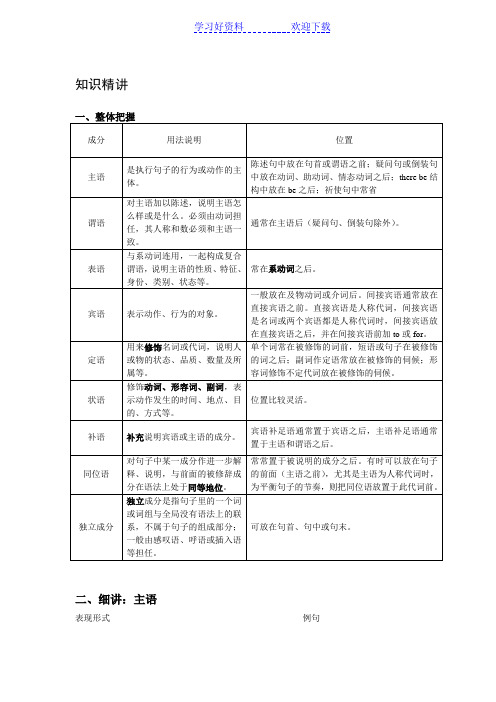
知识精讲二、细讲:主语表现形式例句三、谓语四、表语五.宾语1.宾语的分类六、定语巧学妙计:一般来说,单个形容词、分词、代词、数词或名词作为定于位于被修饰的名词的前面,叫做“前置定语”;副词、介词短语、形容词短语、分词短语、不定式(短语)和定语从句作定语位于被修饰的名词的后面,叫做“后置定语”。
七、状语1. 状语的分类八、补语九、同位语练习与巩固一、指出下列句子划线部分是什么句子成分:1.The students got on the school bus.2. He handed me the newspaper.3. I shall answer your question after class.4. What a beautiful Chinese painting!5. They went hunting together early in the morning.6. His job is to train swimmers.7. He took many photos of the palaces in Beijing.8. There is going to be an American film tonight.9. He is to leave for Shanghai tomorrow.10. His wish is to become a scientist.11. He managed to finish the work in time.12. Tom came to ask me for advice.13. He found it important to master English.14. Do you have anything else to say?15. To be honest, your pronunciation is not so good.16. Would you please tell me your address?17. He sat there, reading a newspaper.18. It is our duty to keep our classroom clean and tidy.19. He noticed a man enter the room.20. The apples tasted sweet.二、分析下列句子成分1. Our school is not far from my home.2. It is a great pleasure to talk with you3. All of us considered him honest.4. My grandfather bought me a pair of sports shoes.5. He broke a piece of glass.6.He made it clear that he would leave the city.7. ---I love you more than her,child .8. Tees turn green when spring comes.9. They pushed the door open.10. Grandma told me an interesting story last night.三.划分句子成分练习1.They are working on the farm now.2.Seeing is believing3.All of us like Kobe Bryant very much4.She became a doctor in 19985.The book lying on the floor are mine6.Suddenly it begins to rain7.To catch the train ,I got up early yesterday8.I always find her happy9.He wonders If I still study English10.The letter which I received the day before yesterday was a friend of mine11.We always work hard at English.12.He said he didn't come.13.She watched her daughter playing the piano.14.Speaking doesn't mean doing.15.Bye the time I got to the station,the train had left.16.The children bought their parents a car for the 25th anniversary of their marriage.17.It takes me an hour to get there.四、选择填空:( )1. ____ will leave for Beijing.A. Now there the manB. The man here nowC. The man who is here nowD. The man is here now( ) 2. The weather ____.A. wet and coldB. is wet and coldC. not wet and coldD. were wet and cold ( ) 3. The apple tasted ____.A. sweetsB. sweetlyC. nicelyD. sweet( ) 4. He got up ____ yesterday morning.A. latelyB. lateC. latestD. latter( )5. The actor ______at the age of 70.A. deadB. diedC. dyedD. deaded学习好资料欢迎下载( )6. ____ were all very tired, but none of ____ would stop to take a rest.A. We, usB. Us, weC. We, ourD. We, we( )7. He found the street much ______.A. crowdB. crowdingC. crowdedD. crowdedly ( ) 8.I think _____necessary to learn English well.A. itsB. itC. thatD. that is( ) 9. The dog ____ mad.A. looksB. is lookedC. is being lookedD. was looked ( )10.I will never forget the day ______ I joined the army.A.thatB. whenC. in whichD. Where四、1~5 CBDBB 6~10 ACBAB。
英语语法 英语句子成分分析
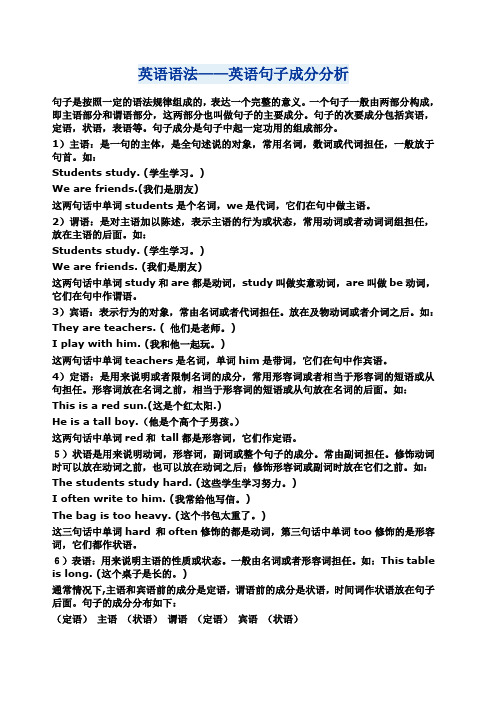
英语语法——英语句子成分分析句子是按照一定的语法规律组成的,表达一个完整的意义。
一个句子一般由两部分构成,即主语部分和谓语部分,这两部分也叫做句子的主要成分。
句子的次要成分包括宾语,定语,状语,表语等。
句子成分是句子中起一定功用的组成部分。
1)主语:是一句的主体,是全句述说的对象,常用名词,数词或代词担任,一般放于句首。
如:Students study. (学生学习。
)We are friends.(我们是朋友)这两句话中单词students是个名词,we是代词,它们在句中做主语。
2)谓语:是对主语加以陈述,表示主语的行为或状态,常用动词或者动词词组担任,放在主语的后面。
如:Students study. (学生学习。
)We are friends. (我们是朋友)这两句话中单词study和are都是动词,study叫做实意动词,are叫做be动词,它们在句中作谓语。
3)宾语:表示行为的对象,常由名词或者代词担任。
放在及物动词或者介词之后。
如:They are teachers. ( 他们是老师。
)I play with him. (我和他一起玩。
)这两句话中单词teachers是名词,单词him是带词,它们在句中作宾语。
4)定语:是用来说明或者限制名词的成分,常用形容词或者相当于形容词的短语或从句担任。
形容词放在名词之前,相当于形容词的短语或从句放在名词的后面。
如:This is a red sun.(这是个红太阳.)He is a tall boy.(他是个高个子男孩。
)这两句话中单词red和tall都是形容词,它们作定语。
5)状语是用来说明动词,形容词,副词或整个句子的成分。
常由副词担任。
修饰动词时可以放在动词之前,也可以放在动词之后;修饰形容词或副词时放在它们之前。
如:The students study hard. (这些学生学习努力。
)I often write to him. (我常给他写信。
(完整版)英语语法——英语句子成分分析
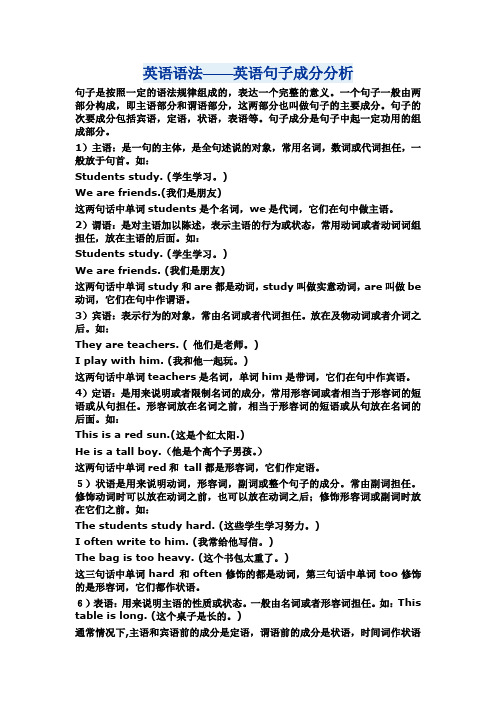
英语语法——英语句子成分分析句子是按照一定的语法规律组成的,表达一个完整的意义。
一个句子一般由两部分构成,即主语部分和谓语部分,这两部分也叫做句子的主要成分。
句子的次要成分包括宾语,定语,状语,表语等。
句子成分是句子中起一定功用的组成部分。
1)主语:是一句的主体,是全句述说的对象,常用名词,数词或代词担任,一般放于句首。
如:Students study. (学生学习。
)We are friends.(我们是朋友)这两句话中单词students是个名词,we是代词,它们在句中做主语。
2)谓语:是对主语加以陈述,表示主语的行为或状态,常用动词或者动词词组担任,放在主语的后面。
如:Students study. (学生学习。
)We are friends. (我们是朋友)这两句话中单词study和are都是动词,study叫做实意动词,are叫做be 动词,它们在句中作谓语。
3)宾语:表示行为的对象,常由名词或者代词担任。
放在及物动词或者介词之后。
如:They are teachers. ( 他们是老师。
)I play with him. (我和他一起玩。
)这两句话中单词teachers是名词,单词him是带词,它们在句中作宾语。
4)定语:是用来说明或者限制名词的成分,常用形容词或者相当于形容词的短语或从句担任。
形容词放在名词之前,相当于形容词的短语或从句放在名词的后面。
如:This is a red sun.(这是个红太阳.)He is a tall boy.(他是个高个子男孩。
)这两句话中单词red和tall都是形容词,它们作定语。
5)状语是用来说明动词,形容词,副词或整个句子的成分。
常由副词担任。
修饰动词时可以放在动词之前,也可以放在动词之后;修饰形容词或副词时放在它们之前。
如:The students study hard. (这些学生学习努力。
)I often write to him. (我常给他写信。
英语语法——英语句子成分分析

英语语法——英语句子成分分析I.八大成分的概念和构成1.主语(名词代词形):句子的主体,是谓语陈述,说明的对象。
2.谓语:表示主语的行为或进行的活动。
3.宾语:行为或活动的对象,接受者或受影响者。
5.补语:补充说明。
(由动词类别来决定)6.定语:对名词性形式进行范围限定。
7.同位语:对被修饰对象进行补充说明或进一步解释。
8.状语:修饰词,短语,从句和整句。
位置:自由自在。
1)修饰性状语:(时间,地点,肯定,否定,程度,频度,方式,伴随,原因,目的,比较等)。
2)连接性状语:(顺序,递进,转折,让步,结果,推论,比较)。
3)评述性状语:修饰整个句子,表示说话人的看法或态度。
II.成分关系1.补语跟着宾语表语跑:补语跟在宾语和表语的后面构成宾补和表补。
把有宾补的句子变成被动语态,则宾补就变成了主补。
To love others makes us happy…to love ourselves makes us lonely.(宾补)We are made happy to love others…we are made lonely to love ourselves.(主补)爱他人使我们幸福,在自己使我们孤单。
2.定语,同位(语)专把名词踹:定语,同位语修饰名词性形式Experience is the best teacher.(被定语所修饰的形式为名词)They are going to Melbourne, the beautiful city in southern Australia.(同位语所修饰的形式为名词)3.谓语动词由状语修饰When you reach for the stars, you may not quite get one, bu t you won’t come up with a handful of sand either.你想摘下天上的星星,可能一个也摘不下;但也不会一无所获。
英语语法英语句子成分分析

英语语法——英语句子成分分析句子是按照一定的语法规律组成的,表达一个完整的意义。
一个句子一般由两部分构成,即主语部分和谓语部分,这两部分也叫做句子的主要成分。
句子的次要成分包括宾语,定语,状语,表语等。
句子成分是句子中起一定功用的组成部分。
1)主语:是一句的主体,是全句述说的对象,常用名词,数词或代词担任,一般放于句首。
如:Students study. (学生学习。
)We are friends.(我们是朋友)这两句话中单词students是个名词,we是代词,它们在句中做主语。
2)谓语:是对主语加以陈述,表示主语的行为或状态,常用动词或者动词词组担任,放在主语的后面。
如:Students study. (学生学习。
)We are friends. (我们是朋友)这两句话中单词study和are都是动词,study叫做实意动词,are叫做be 动词,它们在句中作谓语。
3)宾语:表示行为的对象,常由名词或者代词担任。
放在及物动词或者介词之后。
如:They are teachers. ( 他们是老师。
)I play with him. (我和他一起玩。
)这两句话中单词teachers是名词,单词him是带词,它们在句中作宾语。
4)定语:是用来说明或者限制名词的成分,常用形容词或者相当于形容词的短语或从句担任。
形容词放在名词之前,相当于形容词的短语或从句放在名词的后面。
如:This is a red sun.(这是个红太阳.)He is a tall boy.(他是个高个子男孩。
)这两句话中单词red和tall都是形容词,它们作定语。
5)状语是用来说明动词,形容词,副词或整个句子的成分。
常由副词担任。
修饰动词时可以放在动词之前,也可以放在动词之后;修饰形容词或副词时放在它们之前。
如:The students study hard. (这些学生学习努力。
)I often write to him. (我常给他写信。
英语语法句子成分分析

关于英语句子语法分析关于英语句子语法分析一补语英语补语的作用对象是主语和宾语,具有鲜明的定语性描写或限制性功能,在句法上是不可或缺的。
补语是起补充说明作用的成份。
最常见的补语有宾语补足语和主语补足语。
一、宾语补足语适用宾补的句型:主语+谓语+宾语+宾补(S+V+O+OC) 宾补对宾语加以解释或描述。
以下成分可以充当宾补:名词,代词,形容词,副词,ing形式,ed分词,不定式,介词短语,名词性从句。
二、主语补足语主语+动词+形容词(双谓语) 接在动词之后对主语起着解释或描述作用的成分,叫作主补。
关于英语句子语法分析二同位语当两个词或词组在一个句子中具有相同的语法地位而且描述相同的人或事物时,我们称它们为同位语。
同理,当两个指同一人或事物的句子成分放在同等位置时,若其中一个句子成分是用于说明或解释另一个句子成分的,那么用于起说明或解释作用的句子成分就叫做另一成分的同位语。
用法1 由两个或两个以上同一层次的语言单位组成的结构,其中前项与后项所指相同,句法功能也相同,后项是前项的同位语。
Mr. Smith, our new teacher, i very kind to u.我们的新老师史密斯先生对我们很好。
(Mr. Smith是主词our new teacher的同位语,指同一人。
) Yeterday I met Tom, a friend of my brother". 昨天我遇到了我弟弟的朋友汤姆。
a friend of my brother"是受词Tom的同位语,指同一人。
用法2 如同位语与其同位成分关系紧密时不用逗点隔开;如同位语对其同位成分只作补充解释时可用逗点隔开。
He told me that hi brother John i a world-famou doctor. 他本人对我讲,他的兄长约翰是一位世界闻名的医生。
(brother和John都是单一的字作同位语,与其同位成分之间不用逗点隔开。
语法:英语句子成分分析

句子成分分析知识汇总1.简单句五大基本句子结构:S + V主谓结构S + V + P主系(/谓)表结构S + V + O主谓宾结构S + V + O1 + O2主谓双宾结构S + V + O + C主谓宾补结构2.主语(Subject,缩写为S):可以理解为动作的发起人,或是句子陈述的主体。
主语是一句话的中心,表示所说的是谁或是什么,其位置一般放在句首,无特殊情况英语中主语一般不省略。
可以作主语成分的包括名词,代词,形容词,分词,数词等,以及动词不定式或不定式短语,从句,某些固定词组。
3.表语(Predicative,缩写为P):用来修饰主语,说明主语的身份、性质、品性、特征和状态的,表语位于系动词之后,与系动词联系十分紧密,有系动词就有表语,有表语就有系动词。
通常由名词、形容词、副词、介词短语、不定式、动词的-ing、从句来充当。
表语就是起表述作用的句子成分。
4.系动词,又称连系动词(Linking Verb,缩写为LV):用来辅助主语的动词。
它本身有词义,但不能单独用作谓语,其后必须跟表语,构成系表结构说明主语的状况、性质、特征等情况。
在英语中,系动词的功能主要是把表语和它的主语联系在一起,说明主语的性质、特征、品性或状态。
它有自己的但不完全的词义,不能在句中独立作谓语,必须和后面的表语一起构成句子的谓语。
5.系动词的主要分类:①状态系动词:用来表示主语状态→be动词②持续系动词:用来表示主语继续或保持一种状况或态度→keep, remain, stay, lie, stand③表像系动词:用来表示“看起来像”概念→seem, appear, look④感官系动词→look,feel, smell, sound, taste⑤变化系动词:表示主语变成什么样→become, grow, turn, fall, get, go, come, run⑥终止系动词:表示主语已终止动作→prove, turn out6.谓语(Predicate):可以理解为对主语动作状态或特征的陈述或说明,指出主语做什么、是什么。
英语语法中的句子成分详解

英语语法中的句子成分详解英语中的句子成分有主要成分和次要成分,对英语中的句子成分进行分析是英语语法中的重点。
下面店铺给大家分享的英语语法句子成分分析,希望能帮到你!句子成分的定义构成句子的各个部分叫做句子成分。
句子成分有主要成分和次要成分;主要成分有主语和谓语;次要成分有表语、宾语、定语、状语、补足语和同位语。
英语语法句子成分分析:主语主语是一个句子所叙述的主体,一般位于句首。
但在there be结构、疑问句(当主语不疑问词时)和倒装句中,主语位于谓语、助动词或情态动词后面。
主语可由名词、代词、数词、不定式、动名词、名词化的形容词和主语从句等表示。
例如:During the 1990s, American country music has become more and more popular.(名词)We often speak English in class.(代词)One-third of the students in this claare girls.(数词)To swim in the river is a great pleasure.(不定式)Smoking does harm to the health.(动名词)The rich should help the poor.(名词化的形容词)When we are going to have an English test has not been decided.(主语从句)It is necessary to master a foreign language.(it作形式主语,真正的主语为后面的`不定式)英语语法句子成分分析:谓语谓语说明主语所做的动作或具有的特征和状态。
动词在句中作谓语,一般放在主语之后。
谓语的构成如下:1、简单谓语:由一个动词或动词短语构成。
如:He practices running every morning.2、复合谓语:(1)由情态动词或其他助动词加动词原形构成。
英语语法1——句子成分分析
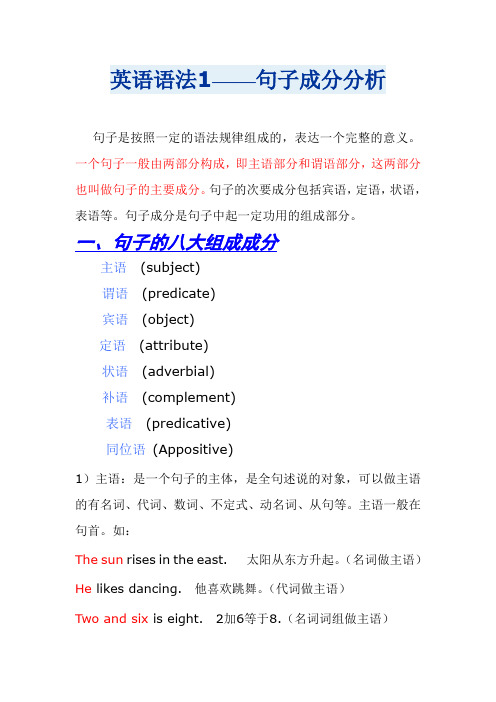
英语语法1——句子成分分析句子是按照一定的语法规律组成的,表达一个完整的意义。
一个句子一般由两部分构成,即主语部分和谓语部分,这两部分也叫做句子的主要成分。
句子的次要成分包括宾语,定语,状语,表语等。
句子成分是句子中起一定功用的组成部分。
一、句子的八大组成成分主语(subject)谓语(predicate)宾语(object)定语(attribute)状语(adverbial)补语(complement)表语(predicative)同位语(Appositive)1)主语:是一个句子的主体,是全句述说的对象,可以做主语的有名词、代词、数词、不定式、动名词、从句等。
主语一般在句首。
如:The sun rises in the east. 太阳从东方升起。
(名词做主语)He likes dancing. 他喜欢跳舞。
(代词做主语)Two and six is eight. 2加6等于8.(名词词组做主语)Seeing is believing.眼见为实。
(动名词做主语)To see is to believe. 眼见为实。
(不定式)What he needs is a book.他所需要的是本书(主语从句做主语)2)谓语:是对主语加以陈述,说明主语是什么,做什么,怎么样,常用动词或者动词词组担任,放在主语的后面。
如:We are friends. 我们是朋友。
She seemed tired. 她看起来累了。
The new term begins on the 1st of September.新学期在九月一日开始。
一个英语句子的组成可归纳如下:句子=主语+谓语例如:Yang Kang is a smart student in his class.主语谓语注意:并不是所有英语句子都由主语和谓语构成(如祈使句和感叹语等)。
这种模式只适用于对大部分普通句型的分析。
简单的句子谓语部分很简单,但大部分句子的谓语部分比较复杂,因此在分析其组成成分时,要引入谓语动词(或谓语动词词组)、宾语、补语、状语等成分。
英语语法句子成分分析

英语语法句子成分分析英语语法句子成分是英语的核心,小编在这里整理了相关知识,希望能帮助到大家。
英语语法句子成分分析句子是由词按照一定的语法结构组成的。
组成句子的各个部分叫做句子的成分。
句子的成分包括:主语、谓语、表语、宾语(直接和间接宾语)、宾语补足语、定语和状语。
主语主语是谓语讲述的对象,表示所说的“是什么”或“是谁”。
一般由名词、代词、不定代词或相当于名词的单词或短语来充当,也有从句充当的现象。
大多数主语都在句首。
如:讲述“谁” We work in a big factory.讲述“什么” The classroom is very big.数词作主语 Three are enough.从句作主语 What we need is food. 我们最需要的是食物.▲ 在“There be …”句型中,主语的位置在中间。
如:There are some bottles of milk in the box.▲ 在个别句型中,主语在整个句子后面,这时前面用it作形式主语。
如:It is very interesting toplay the game called “treat or trick”.It took two workers aboutthree months to build the house.谓语谓语时用来说明主语“做什么”、“是什么”或“怎么样”,谓语必须是动词,谓语和主语在“人称”和“数”两方面必须一致。
如:He is very generous.She looks very smart and coolWe have finished the job.He can speak German.表语表语说明主语“是什么”或“怎么样”,由名词、形容词、介词、副词、不定式及相当于名词的词或短语来充当,它的位置在系动词后面。
形容词作表语You look youngerthan before. 名词作表语Myfather is a teacher. 副词作表语Everyone is here. 介词短语作表语They are at the theatre.不定式作表语My job is to teach them English. 动名词作表语Her job is training the nurses.从句作表语宾语▲宾语是动作、行为的对象,由名词、代词、不定式、或相当于名词的词或短语或从句来充当,它和谓语动词一起说明主语是什么,通常放在谓语动词后面。
英语语法分析-句子成分分析
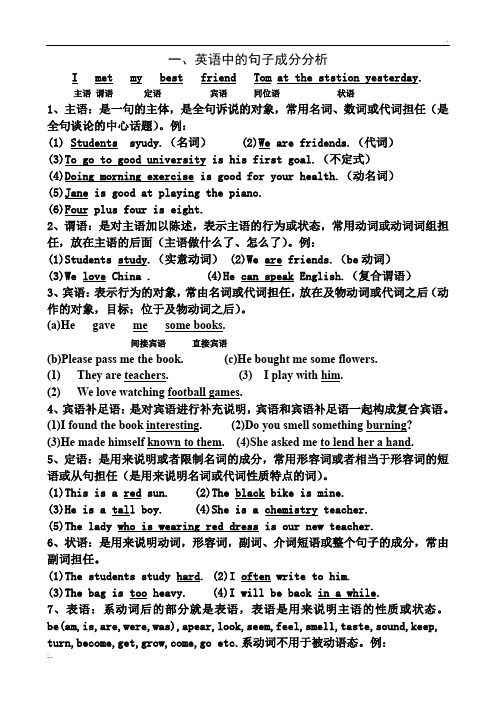
一、英语中的句子成分分析I met my best friend Tom at the ststion yesterday.主语谓语定语宾语同位语状语1、主语:是一句的主体,是全句诉说的对象,常用名词、数词或代词担任(是全句谈论的中心话题)。
例:(1) Students syudy.(名词) (2)We are fridends.(代词)(3)To go to good university is his first goal.(不定式)(4)Doing morning exercise is good for your health.(动名词)(5)Jane is good at playing the piano.(6)Four plus four is eight.2、谓语:是对主语加以陈述,表示主语的行为或状态,常用动词或动词词组担任,放在主语的后面(主语做什么了、怎么了)。
例:(1)Students study.(实意动词) (2)We are friends.(be动词)(3)We love China . (4)He can speak English.(复合谓语)3、宾语:表示行为的对象,常由名词或代词担任,放在及物动词或代词之后(动作的对象,目标;位于及物动词之后)。
(a)He gave me some books.间接宾语直接宾语(b)Please pass me the book. (c)He bought me some flowers.(1)They are teachers. (3) I play with him.(2)We love watching football games.4、宾语补足语:是对宾语进行补充说明,宾语和宾语补足语一起构成复合宾语。
(1)I found the book interesting. (2)Do you smell something burning?(3)He made himself known to them. (4)She asked me to lend her a hand.5、定语:是用来说明或者限制名词的成分,常用形容词或者相当于形容词的短语或从句担任(是用来说明名词或代词性质特点的词)。
英语语法句子成分分析语法基础知识句子成分
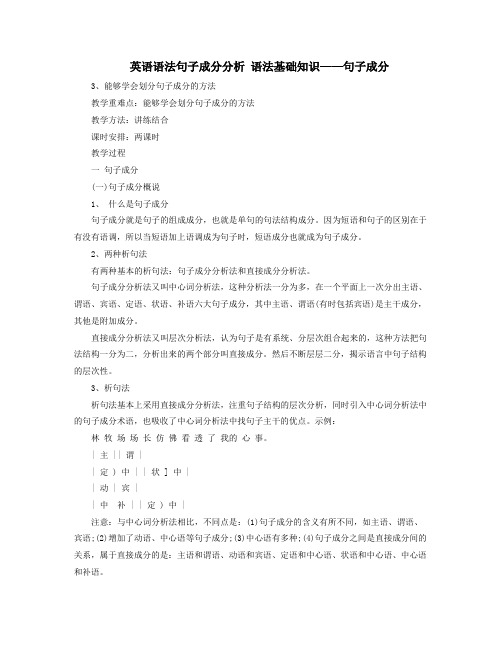
英语语法句子成分分析语法基础知识——句子成分3、能够学会划分句子成分的方法教学重难点:能够学会划分句子成分的方法教学方法:讲练结合课时安排:两课时教学过程一句子成分(一)句子成分概说1、什么是句子成分句子成分就是句子的组成成分,也就是单句的句法结构成分。
因为短语和句子的区别在于有没有语调,所以当短语加上语调成为句子时,短语成分也就成为句子成分。
2、两种析句法有两种基本的析句法:句子成分分析法和直接成分分析法。
句子成分分析法又叫中心词分析法,这种分析法一分为多,在一个平面上一次分出主语、谓语、宾语、定语、状语、补语六大句子成分,其中主语、谓语(有时包括宾语)是主干成分,其他是附加成分。
直接成分分析法又叫层次分析法,认为句子是有系统、分层次组合起来的,这种方法把句法结构一分为二,分析出来的两个部分叫直接成分。
然后不断层层二分,揭示语言中句子结构的层次性。
3、析句法析句法基本上采用直接成分分析法,注重句子结构的层次分析,同时引入中心词分析法中的句子成分术语,也吸收了中心词分析法中找句子主干的优点。
示例:林牧场场长仿佛看透了我的心事。
| 主 || 谓 || 定 ) 中 | | 状 ] 中 || 动 | 宾 || 中补 | | 定 ) 中 |注意:与中心词分析法相比,不同点是:(1)句子成分的含义有所不同,如主语、谓语、宾语;(2)增加了动语、中心语等句子成分;(3)中心语有多种;(4)句子成分之间是直接成分间的关系,属于直接成分的是:主语和谓语、动语和宾语、定语和中心语、状语和中心语、中心语和补语。
4、句子成分概述主语是陈述对象,回答“谁”、“什么”等问题,谓语是对主语加以陈述的,回答“怎么样”、“是什么”、“做什么”等问题,主谓之间用 || 。
动语是支配关涉宾语的,宾语是被支配关涉的对象,动宾之间用 | 。
中心语是被修饰、限制、补充的成分,有主语中心语、宾语中心语、谓语中心语、动语中心语,分别用 = 、 ~、__表示。
英语语法分析句子成分分析

I met my best friend Tom at the ststion yesterday.主语谓语定语宾语同位语状语1、主语:是一句的主体,是全句诉说的对象,常用名词、数词或代词担任(是全句谈论的中心话题)。
例:(1) Students syudy.(名词)(2)We are friends.(代词)(3)To go to good university is his first goal.(不定式)(4)Doing morning exercise is good for your health.(动名词)(5)Jane is good at playing the piano.(6)She went out in a hurry.(7)Four plus four is eight.(8)To see is to believe.(9)Smoking is bad for health.(10)The young should respect the old.(11)What he has said is true.2、谓语:是对主语加以陈述,表示主语的行为或状态,常用动词或动词词组担任,放在主语的后面(主语做什么了、怎么了)。
例:(1)Students study.(实意动词)(2)We are friends.(be动词)(3)We love China.(4)We have finished reading this book.(5)He can speak English.(复合谓语)(6)She seems tired.(7)I saw the flag on the top of the hill.(8)He looked after two orphans.3、宾语:表示行为的对象,常由名词或代词担任,放在及物动词或代词之后(动作的对象,目标;位于及物动词之后)。
宾语分为间接宾语和直接宾语。
英语语法分析句子成分分析

一、英语中句子成分分析I met my best friend Tom at the ststion yesterday.主语谓语定语宾语同位语状语1、主语:是一句主体,是全句诉说对象,常用名词、数词或代词担任〔是全句谈论中心话题〕。
例:(1) Students syudy.〔名词〕 (2)We are fridends.〔代词〕(3)To go to good university is his first goal.〔不定式〕(4)Doing morning exercise is good for your health.〔动名词〕(5)Jane is good at playing the piano.(6)Four plus four is eight.2、谓语:是对主语加以陈述,表示主语行为或状态,常用动词或动词词组担任,放在主语后面〔主语做什么了、怎么了〕。
例:(1)Students study.〔实意动词〕 (2)We are friends.〔be动词〕(3)We love China . (4)He can speak English.〔复合谓语〕3、宾语:表示行为对象,常由名词或代词担任,放在及物动词或代词之后〔动作对象,目标;位于及物动词之后〕。
(a)He gave me some books.间接宾语直接宾语(b)Please pass me the book. (c)He bought me some flowers.(1)They are teachers. (3) I play with him.(2)We love watching football games.4、宾语补足语:是对宾语进展补充说明,宾语与宾语补足语一起构成复合宾语。
(1)I found the book interesting. (2)Do you smell something burning(3)He made himself known to them. (4)She asked me to lend her a hand.5、定语:是用来说明或者限制名词成分,常用形容词或者相当于形容词短语或从句担任〔是用来说明名词或代词性质特点词〕。
英语语法分析句子成分分析

I met my best friend Tom at the ststion yesterday.主语谓语定语宾语同位语状语1、主语:是一句的主体,是全句诉说的对象,常用名词、数词或代词担任(是全句谈论的中心话题)。
例:(1) Students syudy.(名词)(2)We are friends.(代词)(3)To go to good university is his first goal.(不定式)(4)Doing morning exercise is good for your health.(动名词)(5)Jane is good at playing the piano.(6)She went out in a hurry.(7)Four plus four is eight.(8)To see is to believe.(9)Smoking is bad for health.(10)The young should respect the old.(11)What he has said is true.2、谓语:是对主语加以陈述,表示主语的行为或状态,常用动词或动词词组担任,放在主语的后面(主语做什么了、怎么了)。
例:(1)Students study.(实意动词)(2)We are friends.(be动词)(3)We love China.(4)We have finished reading this book.(5)He can speak English.(复合谓语)(6)She seems tired.(7)I saw the flag on the top of the hill.(8)He looked after two orphans.3、宾语:表示行为的对象,常由名词或代词担任,放在及物动词或代词之后(动作的对象,目标;位于及物动词之后)。
宾语分为间接宾语和直接宾语。
- 1、下载文档前请自行甄别文档内容的完整性,平台不提供额外的编辑、内容补充、找答案等附加服务。
- 2、"仅部分预览"的文档,不可在线预览部分如存在完整性等问题,可反馈申请退款(可完整预览的文档不适用该条件!)。
- 3、如文档侵犯您的权益,请联系客服反馈,我们会尽快为您处理(人工客服工作时间:9:00-18:30)。
英语语法分析句子成分
分析
TPMK standardization office【 TPMK5AB- TPMK08- TPMK2C- TPMK18】
一、英语中的句子成分分析
I met my best friend Tom at the ststion yesterday.
主语谓语定语宾语同位语状语
1、主语:是一句的主体,是全句诉说的对象,常用名词、数词或代词担任(是全句谈论的中心话题)。
例:
(1) Students syudy.(名词) (2)We are fridends.(代词)
(3)To go to good university is his first goal.(不定式)
(4)Doing morning exercise is good for your health.(动名词)
(5)Jane is good at playing the piano.
(6)Four plus four is eight.
2、谓语:是对主语加以陈述,表示主语的行为或状态,常用动词或动词词组担任,放在主语的后面(主语做什么了、怎么了)。
例:
(1)Students study.(实意动词) (2)We are friends.(be动词)
(3)We love China . (4)He can speak English.(复合谓语)
3、宾语:表示行为的对象,常由名词或代词担任,放在及物动词或代词之后(动作的对象,目标;位于及物动词之后)。
(a)He gave me some books.
间接宾语直接宾语
(b)Please pass me the book. (c)He bought me some flowers.
(1)They are teachers. (3) I play with him.
(2)We love watching football games.
4、宾语补足语:是对宾语进行补充说明,宾语和宾语补足语一起构成复合宾语。
(1)I found the book interesting. (2)Do you smell something burning?
(3)He made himself known to them. (4)She asked me to lend her a hand.
5、定语:是用来说明或者限制名词的成分,常用形容词或者相当于形容词的短语或从句担任(是用来说明名词或代词性质特点的词)。
(1)This is a red sun. (2)The black bike is mine.
(3)He is a tall boy. (4)She is a chemistry teacher.
(5)The lady who is wearing red dress is our new teacher.
6、状语:是用来说明动词,形容词,副词、介词短语或整个句子的成分,常由副词担任。
(1)The students study hard. (2)I often write to him.
(3)The bag is too heavy. (4)I will be back in a while.
7、表语:系动词后的部分就是表语,表语是用来说明主语的性质或状态。
be(am,is,are,were,was),apear,look,seem,feel,smell,taste,sound,keep,
turn,become,get,grow,come,go etc.系动词不用于被动语态。
例:
(1)This table is long . The apple tastes sweet.
(2)The war was over . They seem to know the truth.
通常情况下,主语和宾语前的成分是定语,谓语前的成分是状语,时间作状语放在句子的后面。
(定语)主语(状语)谓语(定语)宾语(状语)。
(1)(The tall)boy(often)go(to the big)zoo.
(2)(The happy)child-went(his)home yesterday.
英语五种基本句型:基本句型一:S+V (主+谓)
基本句型二:S+V+P (主+系+表)
基本句型三:S+V+O (主+谓+宾)
基本句型四:S+V+o+O (主+谓+间宾+直宾)
二、从句
从句是相对于主句而言的,即它是从属于某一个主句,而不能单独做一个句子。
英语中主要有三大从句,即名词性从句(包括主语从句,定语从句,表
语从句,同位语从句)、形容词性从句(即定语从句)、副词性从句(即状语从句,包括时间,结果,条件,目的,原因,让步,地点,方式等)
1.主从作主语,例:That the earth is round is truth.
2.宾从作宾语,例:Do you know where he lives?
3.表从左表语,:My opinion is that you should not go alone.
(一)主语从句
一、1、定义:作句子主语的从句叫做主语从句。
2、引导词:主语从句通常由从属连词that,whether,if和连接代词
what,who,which,whatever,whoever以及连接副词how,when,where,why等词引导,that在句中无词义,只起连接作用;连接代词和连接副词在句中既保留自己的疑问含义、又起连接作用,在从句中充当从句的成分。
例:
(1)What he wants to tell us is not clear.他要跟我们说什么,还不清楚。
(2)Who will won the match is still unknown.谁能赢得这场比赛还不得而知。
(3)It is known to us how he became a writer.我们都知道他是如何成为一名作家的。
(二)定语从句
1、关系词:引导定语从句的关联词称为关系词。
关系词有关系代词和关系副词。
关系代词有that,which,who,whom,whose,as等;
关系副词有where,when,why等。
关系词常有3个作用:(1)引导定语从句,(2)代替先行词,(3)在定语从句中担当一个成分。
二、关系代词引导的定语从句:
1、who指人,在从句中作主语。
(1)The boys who are playing football are from Class One.
(2)Yersterday I helped an old man who lost his way.
2、whom指人,在定语从句中充当宾语,常可省略。
(1)Mr. Liu is the person whom you talked about on the bus.
(2)Mr. Ling is just the boy whom I want to see.
注意:关系代词whom在口语和非正式语体中常用who代替,可省略。
(3)The man who/whom you met just now is my friend.
3、which指物,在定语从句中作主语或者宾语,作宾语时可省略。
(1)Football is a game which is liked by most boys.
(2)This is the pen which he bought yersterday.
4、that指人时相当于who或者whom;指物时,相当于which。
在宾语从句中作主语或者宾语,作宾语时可省略。
(1)The number of the people that/who come to visit the city each year rises one million.
(2)Where is the man that/whom I saw this morning?。
